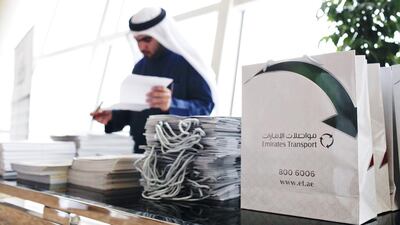Expatriates working in the UAE are far more focused on the salaries they receive than Emiratis, a poll has found.
A survey of Emiratis and expats working full-time found that for expat jobseekers financial remuneration and the level of appreciation they receive for their work topped the list of the key factors to consider when choosing a job.
For Emirati jobseekers, however, job security and a company’s reputation came out as the key considerations taken into account when applying for jobs,
The survey of 502 male and female respondents (comprising 175 Emiratis and 327 expats) between the ages of 21 and 50 found that Emiratis also prized company values, financial stability, good relationships with colleagues, corporate social responsibility, a good work-life balance, leadership responsibilities, a high-performance culture and learning and development opportunities.
In contrast, expats reported that besides money, they were most motivated by a good work-life balance, good relationships with co-workers, leadership responsibilities, learning and development opportunities, company values, job security, financial stability and lastly, job content.
“For Emiratis, a competitive compensation package is not a top concern,” said Bas Van Ulden, project leader at BCG Middle East. “What lures them in is job satisfaction – and the ability to do work that not only makes them proud but also reflects their true values and deeply ingrained principles. While that may be surprising to some, knowing this is key to attracting and retaining young Emirati recruits.”
The survey, which was put together by the management firm Boston Consulting Group and The Network, an alliance of more than 50 recruitment websites, found that although job security was at the top of the list of desired workplace attributes among Emiratis between the ages of 21 to 40, it was only the third-highest priority for respondents ages 41 to 50.
For all workers, the overall compensation package became more of a priority once they grew out of their thirties. At the same time, the work environment faded in importance as workers enter their forties.
“People holding top management positions typically feel quite accomplished; more importantly, they are sought-after in the marketplace and have high-profile connections and a large network – which means they are not too worried about losing their job or being unemployed,” added Mr Van Ulden. “That is precisely why HR departments in the UAE will have to, over the next 10 years, work hard to find different ways to incentivise and retain their top talent.”
Last month a poll of UAE-based students by the employer branding specialist Universum found that UAE-based companies including Emirates, Emaar Properties and Abu Dhabi National Oil Company topped students’ preferred employers of choice.
Emirati students who were surveyed said they were more motivated by a culture of respect at the workplace than material rewards.
Emirati students identified “a respect for its people” as the No 1 criterion in choosing an employer, followed by a creative and dynamic work environment, and high future earnings.
Non-Emirati respondents, however, said “high future earnings” was their top criterion, followed by professional training and development, and a creative and dynamic work environment.
Business administration students ranked Emirates top of their lists, followed by Google, Etihad Airways, Emaar and Adnoc.
For IT and engineering students, Google and Microsoft were the top employers of choice, in line with their global peers, followed by Adnoc, Emaar and Masdar.
lbarnard@thenational.ae
Follow The National's Business section on Twitter

